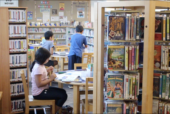Self expression through fashion is not a new concept, but Harajuku enthusiasts have taken the style of J-fashion a step further than self expression, creating a community in which they feel protected and inspired.
Once a month Harajuku fashion enthusiasts parade along 1st street in Los Angeles’ Little Tokyo, in bright colors and bold patterns for what is called Harajuku Day. Some participants wear dresses like those that might be seen on old fashioned dolls, while others choose a more gothic-influenced look.
“Just being around other creatives, and being in a space that is very positive, gives you room to grow,” said co-organizer of the Valley Tea and Cake Society, Theodore Danielle Doncaster.
In the late 1970s, Tokyo’s Harajuku District became a center for young people’s fashion retail. FRUiTS Magazine, founded in 1997, became a platform for those who wanted to express themselves through their wardrobe. But more than 20 years later, this form of self expression is not only for individuals, but also for bringing a diverse group together to build a positive and uplifting community.
“The driving force of going out and putting everything together is community,” Harajuku Day Organizer Monique Morentin-Guzman said. “You want to be able to feel like yourself around other people.” She said Harajuku Day is all about expression through fashion, and about putting on this style of clothing, as a kind of ‘armor for the soul’.
Harajuku Day participants, and even those called “Harajuku Lifestylers,” who choose to dress this way daily, said they feel it is a protection from the negative aspects of society, and a chance to express their ideal self. They said Harajuku fashion can also be seen as a platform for people to rebel against fashion norms, especially those defining gender norms.
“The idea of Harajuku fashion is very punk rock,” Doncaster said. “It came out of a need to rebel against society’s expectations, especially for women.”
The Japanese Fashion meet-up in Los Angeles’ Little Tokyo started in 2015, and has become a safe haven for those who desire to go out in fully coordinated outfits and be a part of a positive environment. “It is a good, friendly, welcoming, and wholesome environment,” regular participant Jasmine Rose said.
Some misconceptions still surround Harajuku Day enthusiasts. Participants said they are often asked whether they have jobs, and how they can take part in such a bizarre past time. Participants said they respond that they do have normal jobs, and normal lives, and that this is how they express themselves. “I feel like the expression of this is my soul,” Doncaster said. ” I am wearing it as armor. It is a way of embracing your ideal self.”
Harajuku Day fashion is becoming a popular way to express one’s personal style, and Harajuku fashion is becoming more normalized in American culture.
“It’s a hobby and it’s a lifestyle,” Morentin-Guzman said.
Moderator: Nicholas Gargiulo
Producer: Christian Pineda
Anchor: Cristal Morales Rodriguez
Social Media Editor: Ashley Hawn
Reporters: Wiam Dahbi, Nicholas Gargiulo, Ashley Hawn, Karina Gutierrez, Cristal Morales Rodriguez and Christian Pineda

 Tweet this Video
Tweet this Video Share on Facebook
Share on Facebook Share via E-mail
Share via E-mail

